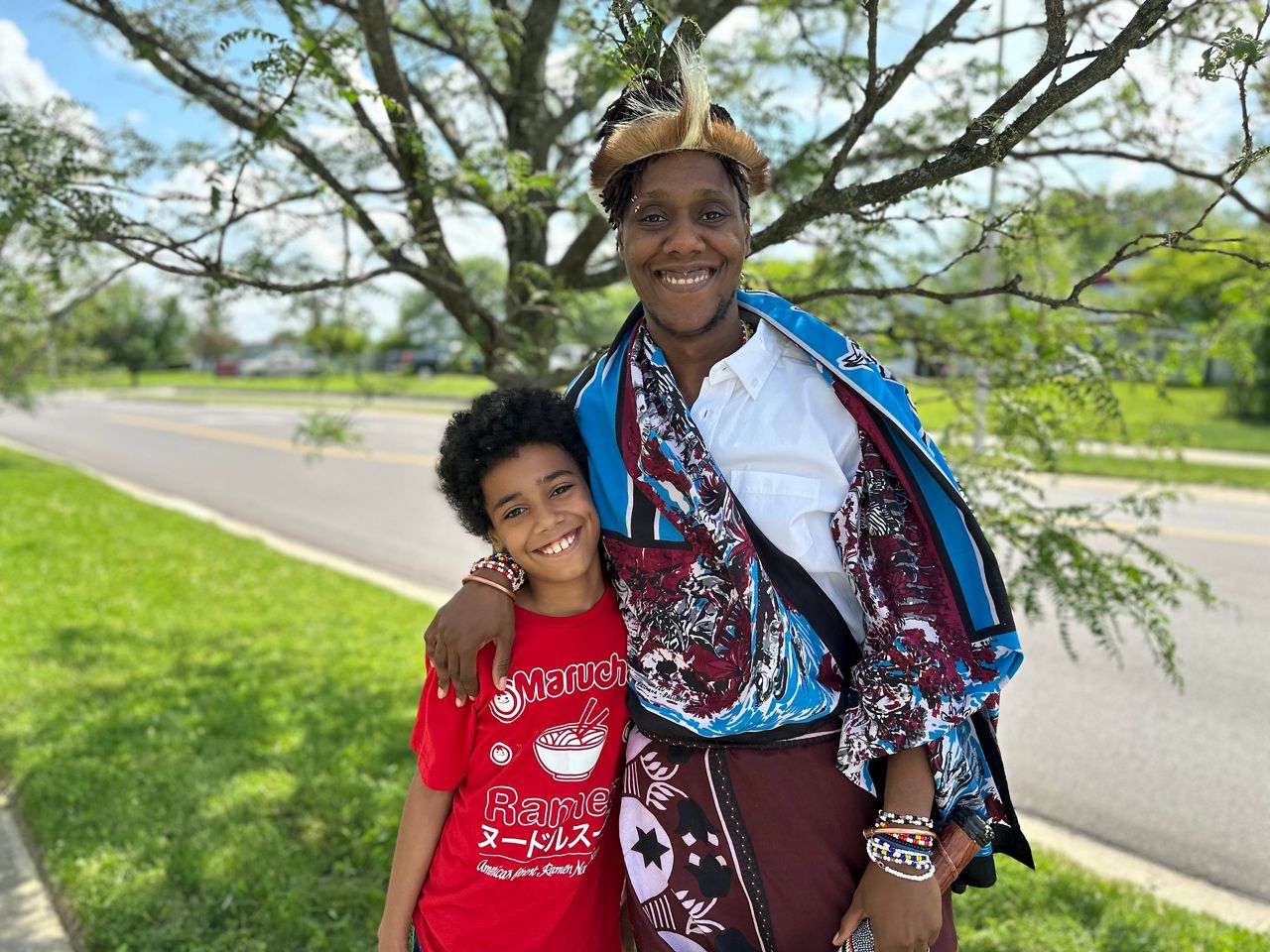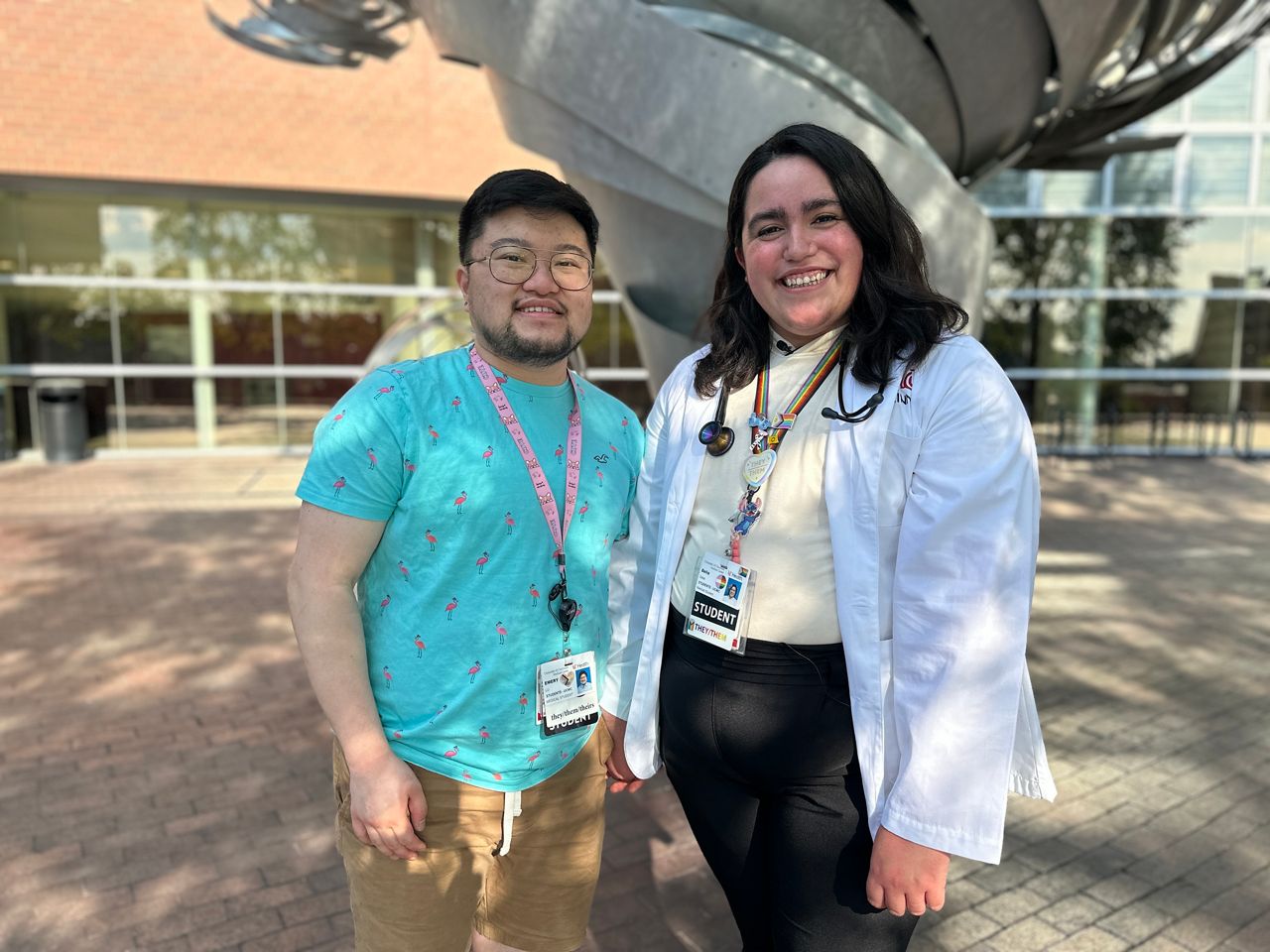She, her, he and him are the typical pronouns we hear everyday to reference someone's gender.
But what if you don’t feel like those fit who you are? Or what if you’re born with characteristics of both?
“I am not the typical female, not the typical male,” said Delia Sosa, a medical student at The University of Cincinnati. “I just fall somewhere between.”
“My son, sometimes he calls me mom, sometimes he calls me dad,” said India “Indalo” Holley, a resident of Dayton.

Sosa and Holley are two very different people, from different cultures, and cities in Ohio, but who both use they/them pronouns as “they” is considered gender-neutral.
“They/them fits me more because that embodies my whole authenticity,” Holley said. “It's a combination of masculine and feminine.”
Assigned female at birth, Holley was adopted and raised by Native American parents. They’re what’s known as "two-spirit,” a term used in Native American culture to define someone who isn’t male or female, but embodies both masculine and feminine souls.
“I have facial hair naturally, always have. I've naturally always had an Adam's apple, a deeper voice,” Holley said. “I know what it's like to go into a guys restroom. I know what it's like to give birth to a baby.”
In Native American tribes, two-spirit people are praised and respected. They’re known to be healers and leaders and have spiritual gifts.
“Being a two-spirit is more than just a gender identity,” Holley said. “You kind of fit in almost every category, which is why two-spirits we're given the roles as shamans or tribal leaders or commanders in war, because we're able to relate to the males, we're able to relate to women, we're able to relate to both. We're able to relate to the people that's in between, because we literally embody both of the energies that keep everything in balance.”
They say because of colonization of the Americas, peoples’ knowledge of two-spirit people is limited.
"The general public does not understand the term two-spirit due to colonization,” Holley said. “Because of colonization, a lot of that history has been untaught and wiped away because they didn't understand it. And a lot of times, unfortunately, the saying goes, what you fear, you destroy and what you don't understand, you fear.”
More often two-spirit people are identifying within the LGBTQ+ community, but Holley said they’re not transgender or nonbinary.
“A nonbinary person believes that they're neither male or female, whereas a two-spirit person embodies being both male and female,” Holley said. “Two-spirits fall underneath the transgender umbrella because everything wants to be in a category as far as American culture goes. So that seems to be the best place for us to fit in. Although, being a two-spirit is more than just a gender identity, it’s actually our culture.”
In Cincinnati, Sosa is what’s known as intersex, which is a term used to describe someone born with a combination of male and female biological traits. Sosa said some intersex traits are noticed at birth, while others don't show up until puberty or later in life. Sosa said they found out they were intersex by accident when they began growing a full beard and went to a doctor for testing.
“I have some combination of hormones and chromosomes and anatomy that's different from what we expect to see in the typical male or the typical female. So intersex literally means between the sexes, and that's where I fall,” Sosa said. “There are way more intersex people in the world than a lot of folks realize. Not everyone uses the term intersex, and that's okay, but I think in general, we don't talk enough about the diversity of lived experiences that each of our bodies has and how much variety there is in terms of the anatomy and primary and secondary sex characteristics that each person has.”
Assigned female at birth, Sosa also identifies as transgender and said the pronouns “she and her” don’t feel comfortable as those pronouns don’t reflect their full self.
“My body doesn't fit into the male and female binaries, and neither does my gender identity,” Sosa said. “When I started using they/them pronouns, it just felt like it fit. Like when you put on a new dress or a new shirt that just fits you exactly how you want it to.”

Sosa uses their social media to spread awareness about being intersex and using alternative pronouns. As a soon-to-be doctor, they hope to provide healthcare to the LGBTQ+ community and decrease discrimination for transgender, nonbinary and intersex people.
“We're seeing a lot of intersex folks who aren't getting the care that they need and are actually getting some care that is harmful,” Sosa said. “We're seeing trans folks being unable to access care at all, depending on what state they live in and what the regulations look like.”
Sosa said some people think that being born intersex is a negative thing or that it’s a disorder.
“I just want to remind people that being trans and being intersex is not inherently a negative thing,” Sosa said. “A lot of us are proud to be who we are. A lot of us have put in a lot of work and a lot of tears and pain to not only figure out who we are and to figure out these parts of ourselves, but to learn how to navigate a world that doesn't want us here.”
As a life coach and reiki master, Holley uses their two-spirit identity to help people embrace who they are and find a deeper meaning in life.
“I want everybody to be seen for who it is they are, for the human being that they are, the life force that they carry and having a purpose,” Holley said. “I'm me for a reason. Everybody is here for a purpose, for a reason. Whether someone understands that or not, it's not for anybody to understand my life path, my destiny. That is something sacred between me and the creator."
Holley and Sosa said they both walk through life proud of who they are as they represent the intricacies of the human race.
“We learn in science classes and in med school that nature is a spectrum, bodies are a spectrum, and sex is no exception to that. There really is just so much variation, not even amongst intersex people, but just from person to person in who we are as people and what our bodies look like,” Sosa said. “That's not unnatural. It's not an ideology. It's not something that is inherently a bad thing. It's just part of human nature and it's part of our existence and evolution as a species. We are supposed to be diverse, and we are supposed to exist as this conglomeration of people from all across the world and with different identities and lived experiences, and being a trans and intersex person is just one example of how we can share and celebrate in that diversity.”
Every day they refuse to allow society to put them in a box and encourage others to celebrate diversity and embrace differences.
“There is nothing in this world that is exactly the same. Even identical twins have different fingerprints, different personalities, different likes, different dislikes. That is the one thing that everything has in common is the fact that everything is different,” Holley said. “That's what makes life the miracle that it is. We are all literally walking miracles.”
Through advocacy, education and visibility they both hope people realize that no one person is the same, but that we all have the ability to love instead of hate.
“One thing I could say from studying different religions and different belief systems is that the core similarity is love,” Holley said. “You're special. You're unique. You're not the only person that's out there. Love you for who it is that you are. Be you for who it is that you are and there's plenty of community and love out there in the world. You're a soul. You're an energy source, and you're here for a reason. You're here for a purpose. Embody it. Live it.”
Their messages to others this Pride month are to meet someone from a different walk of life than you, start up a conversation and listen with empathy.
“My message to people who are not trans or intersex would be to really put in some effort, not just this Pride month, but year round, to see us as human, to get to know us, to learn our stories, and to start to recognize that we're human beings just like you and we're not these monsters that are some kind of figment of your imagination,” Sosa said.



